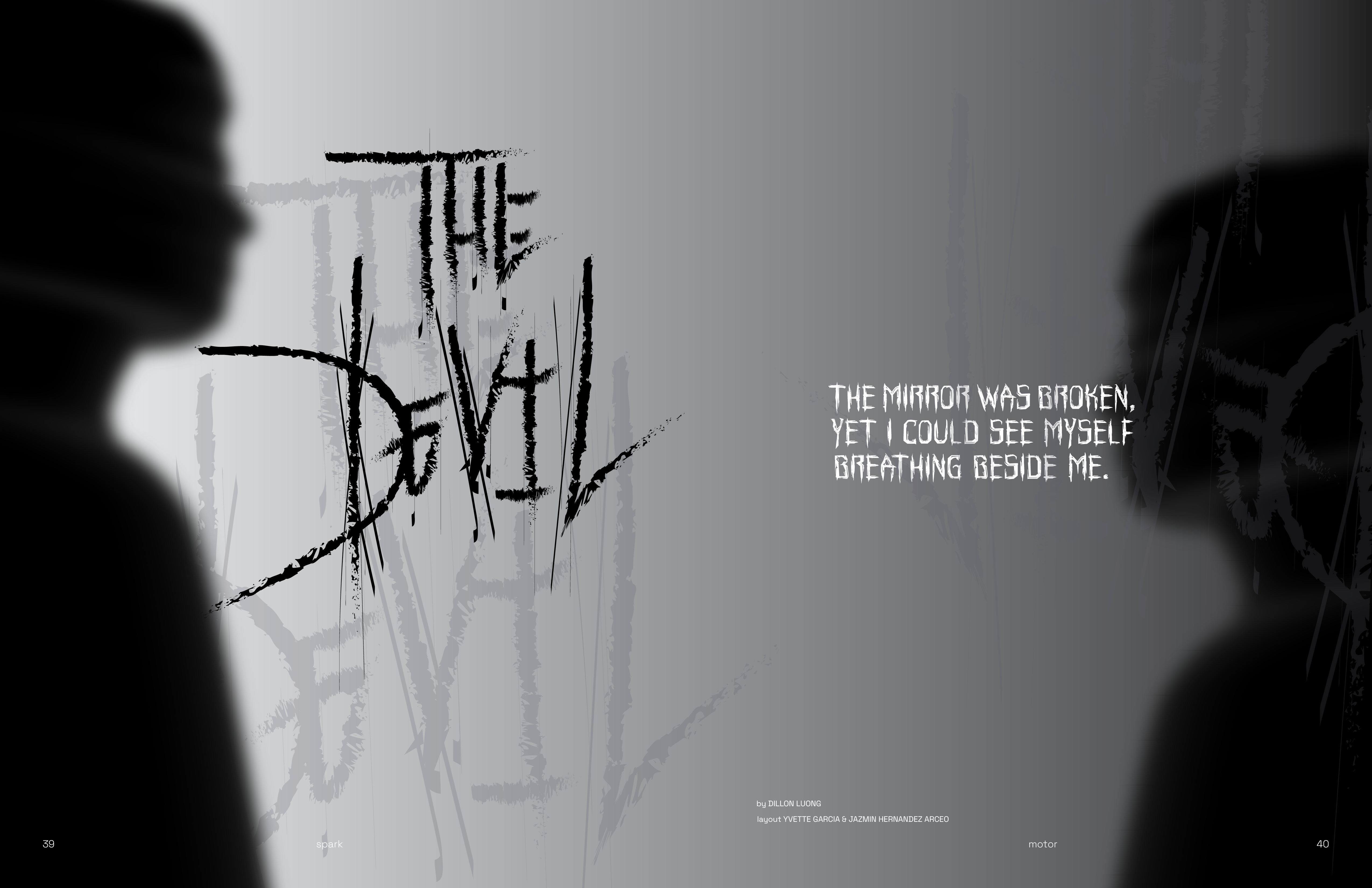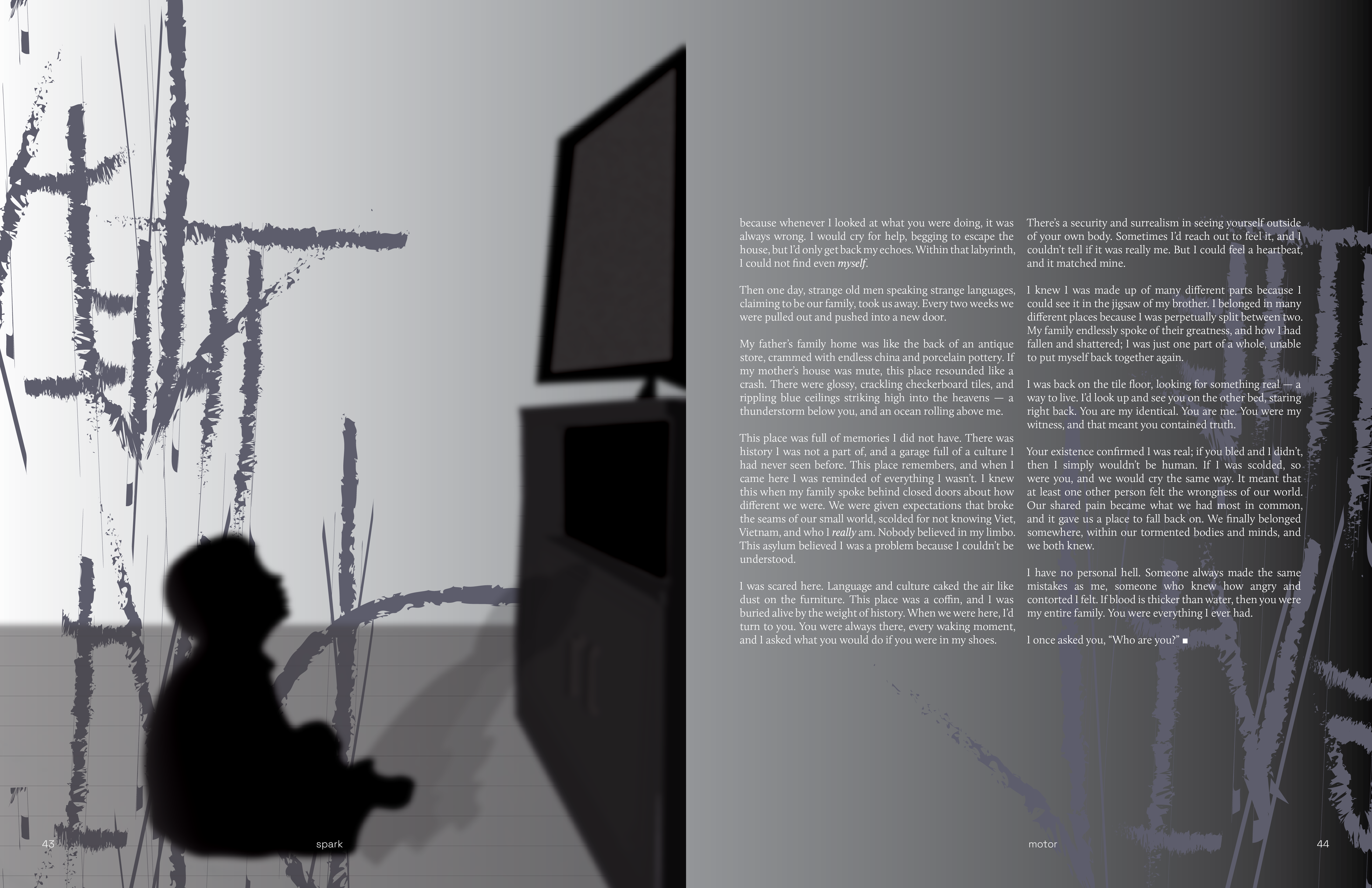The Devil
By Dillon Luong
December 8, 2024



The mirror was broken, yet I could see myself breathing beside me.
Your memory is a maze, full of hallway into turn into turn into turn. There are always two doors.
The house is washed out, everything is white: the corners, the countertops, the crop-dust marble tile. This place lulls you like a mirage and you melt into the hot room, falling to the tile floor. You are looking for something cool to the touch — something real.
You look up and see yourself sitting beside you on the other bed, staring right back. You are an identical twin. You are my identical twin. I am you.
At first, I didn’t know if you were real. I was just a kid. That house was placeless, and you were the imaginary friend that belonged to it. It was our mother’s house, hazy and without personality. She grew up a mixed kid after the Vietnam War. This meant that in her own country, she was nicknamed The Devil — an embodiment of what white men had done to Vietnam’s dignity — and was orphaned and ostracized to the States. She became a single mother without a culture. We became a family without precedent, so you and I were never complete — in limbo.
I know I am real; I remember my mother’s house. I remember staring into speckled, popcorn walls as Saturday cartoons beat on deaf eardrums. The world was muffled as my senses suffocated with asthma. All would be quiet until I heard wheezing to my left, and I would turn, and see you again. You were a reminder that my voice and breath were being used by someone else. My ability to cry out and to live was someone else’s right, and I remember how you would steal the act of existence from me. I did not have a place or being. Yet, you were somehow both.
In elementary school, I learned that siblings imitated each other. This was how you took parts of me, and I knew I had to find myself anew, and anew, and anew. I had to be more than the empty foundations laid upon us, more than everything you took to fill that void; I had to be more than even myself, or else I would have nothing.
Our mother’s house crumpled up like balls of paper. Her house was all she owned. I was standing within everything her life amounted to; her entire self, written on those paper walls. I couldn’t discern each crinkle without a culture. My mother was scattered across the house like ashes. Sometimes, I’d look for her – where I started and ended – and the hallways always led me back where I began, and you were still there. We’d scribble crayon all over the house, hoping to chart the sameness that kept us in circles. But all we'd see were a madman's scrawls, trying to prove he wasn’t talking to himself.
You were my reflection, and we lived in a house of mirrors. I was everything and everything was me; I was meaning, and if you mimicked my every movement, I, too, was creation. I sought an epiphany, deriving meaning from itself, but everything I tried had already been done on the other side of the glass. This was how I found hell, by searching for divinity.
All I found was endless insecurity and fault in what I saw because I was only human. Being a twin meant that you were the weakness and sin I had to excise — an enemy and a means to an end. If I was in some indeterminate hell, and my mother was evil incarnate, then when you stood across from me, mirroring my countenance and contemplations, what did that make you? I began to claw at my face wishing I looked like anything but you. I knew you wanted to become me.
When we entered middle school, our mother spoke of becoming important — someone with power, money, and everything they wanted. She wanted more for us than she ever had, so we competed for everything. You were a doppelganger trying to take over my life. We shared the same interests, the same friends, and the same grades. There was an expectation: if I didn’t reach the finish line first, I would be trapped in the sameness that haunted me. I didn’t know where this would end, and looking over at you was like cheating on myself. Our mother wanted us to become something; I only wanted to become someone.
If you were me, then I was the narrator watching my own predictable story. You made my mistakes, and I learned while watching from the outside in. Having a twin means seeing your reflection, and watching it move on its own; I couldn’t tell if it gave me more or less control of my identity. I wasn’t a person. I was I, and you were you. Everything you did was my road not taken and, suddenly, the mirror between us became a kaleidoscope of who I was, wasn’t, and will be.
You were a cuckoo, implanted in my nest and chasing me to be me first. Our mother never compared us to others, only to each other, like she could only support one of us. We had no excuses. We were the same person. All of my faults were splayed out in front of me. In you. I hated you. You were here to prove that I couldn’t beat even my own expectations, that I was a shadow of someone else. I couldn’t fathom making my own decisions, knowing that someone knew them before I did. I couldn’t trust myself or my perspective on the world because whenever I looked at what you were doing, it was always wrong. I would cry for help, begging to escape the house, but I’d only get back my echoes. Within that labyrinth, I could not find even myself.
Then one day, strange old men speaking strange languages, claiming to be our family, took us away. Every two weeks we were pulled out and pushed into a new door.
My father’s family home was like the back of an antique store, crammed with endless china and porcelain pottery. If my mother’s house was mute, this place resounded like a crash. There were glossy, crackling checkerboard tiles, and rippling blue ceilings striking high into the heavens — a thunderstorm below you, and an ocean rolling above me.
This place was full of memories I did not have. There was history I was not a part of, and a garage full of a culture I had never seen before. This place remembers, and when I came here I was reminded of everything I wasn’t. I knew this when my family spoke behind closed doors about how different we were. We were given expectations that broke the seams of our small world, scolded for not knowing Viet, Vietnam, and who I really am. Nobody believed in my limbo. This asylum believed I was a problem because I couldn’t be understood.
I was scared here. Language and culture caked the air like dust on the furniture. This place was a coffin, and I was buried alive by the weight of history. When we were here, I’d turn to you. You were always there, every waking moment, and I asked what you would do if you were in my shoes.
There’s a security and surrealism in seeing yourself outside of your own body. Sometimes I’d reach out to feel it, and I couldn’t tell if it was really me. But I could feel a heartbeat, and it matched mine.
I knew I was made up of many different parts because I could see it in the jigsaw of my brother. I belonged in many different places because I was perpetually split between two. My family endlessly spoke of their greatness, and how I had fallen and shattered; I was just one part of a whole, unable to put myself back together again.
I was back on the tile floor, looking for something real — a way to live. I’d look up and see you on the other bed, staring right back. You are my identical. You are me. You were my witness, and that meant you contained truth.
Your existence confirmed I was real; if you bled and I didn’t, then I simply wouldn’t be human. If I was scolded, so were you, and we would cry the same way. It meant that at least one other person felt the wrongness of our world. Our shared pain became what we had most in common, and it gave us a place to fall back on. We finally belonged somewhere, within our tormented bodies and minds, and we both knew.
I have no personal hell. Someone always made the same mistakes as me, someone who knew how angry and contorted I felt. If blood is thicker than water, then you were my entire family. You were everything I ever had.
I once asked you, “Who are you?”
You shrugged. I shrugged too. There is no answer greater than silence, and no punishment greater than forgiveness. There’s a comfort in seeing through the windows of your own soul, knowing that this hell is real. The devil might be in front of you for all you know, but for some reason or another, he looks exactly like you. ■
Layout: Yvette Garcia & Jazmin Arceo Hernandez
Other Stories in Motor
© 2025 SPARK. All Rights Reserved.
